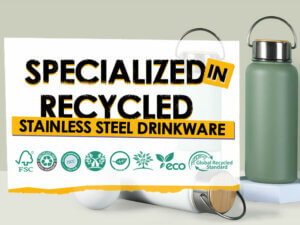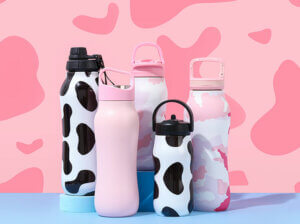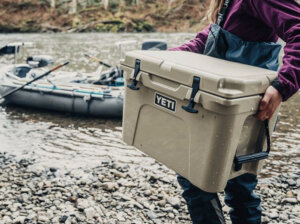Amidst the growing concern for the well-being of our planet, both individuals and businesses are actively seeking avenues to diminish their carbon footprint. An exemplary illustration of a sustainable product addressing this concern is the eco-friendly water bottle. Crafted with materials that prioritize environmental consciousness and adhering to stringent certifications, these water bottles emerge as an ideal choice for those committed to upholding sustainability.
The Imperative for Eco-Friendly Water Bottles
Conventional plastic water bottles have long been linked to issues of pollution and waste. Their contribution to the ever-expanding predicament of plastic pollution poses a threat to wildlife and contaminates our oceans and landfills. In stark contrast, eco-friendly water bottles strive to curtail these adverse repercussions. By embracing an eco-friendly alternative, you actively participate in the global endeavor to diminish waste.
Understanding Recycled Materials
A pivotal characteristic of eco-friendly water bottles is their utilization of recycled materials. These bottles are frequently crafted from recycled stainless steel, plastic, glass, renewable materials (e.g. bamboo, coffee grounds, wheat straw, UPM) which entails the transformation of collected plastic waste into a fresh, new product through a rigorous process. By employing recycled materials, eco-friendly water bottles facilitate the diversion of waste from landfills, conserve energy.
Recycling Certifications and Their Significance
To ensure the authenticity and sustainability of eco-friendly water bottles, several certifications play a vital role. Let’s explore the significance of some prominent certifications:
RCS (Recycled Claim Standard)
The RCS certification guarantees that the materials used in the production of eco-friendly water bottles are genuinely recycled. It provides transparency and traceability throughout the supply chain, assuring consumers that the product they choose meets the required recycled content standards.
GRS (Global Recycled Standard)
The GRS certification focuses on verifying the use of recycled materials in products. It sets clear guidelines for companies to follow in terms of material traceability, environmental practices, social requirements, and chemical restrictions. GRS-certified eco-friendly water bottles provide consumers with confidence in their sustainable choice.
GLF (The Green Leaf Foundation)
The GLF certification plays a pivotal role in ensuring that eco-friendly water bottles are produced using environmentally conscious practices. This esteemed certification takes various factors into consideration, including energy consumption, carbon emissions, and waste management. Opting for GLF-certified bottles signifies your dedication to endorsing companies that prioritize sustainable manufacturing processes. By making this choice, you actively contribute to the preservation of our planet and support the advancement of eco-friendly initiatives.
ISCC (International Sustainability and Carbon Certification)
The ISCC certification emphasizes the importance of sustainability and carbon reduction. It verifies that the entire supply chain, from raw material extraction to manufacturing, adheres to stringent sustainability criteria. ISCC-certified eco-friendly water bottles demonstrate a dedication to reducing carbon emissions and environmental impact.
Conclusion
Eco-friendly water bottles present a sustainable alternative to conventional plastic bottles, actively contributing to the preservation of our environment. Through the utilization of recycled materials and adherence to esteemed certifications such as RCS, GRS, GLF, and ISCC, these bottles offer consumers an eco-conscious choice. As individuals, we possess the capacity to effect positive change through the products we embrace.
FAQs
Q1: Are eco-friendly water bottles more expensive than regular plastic bottles?
No, eco-friendly water bottles are available at various price points, and some options are competitively priced with regular plastic bottles.
Q2: Can I use eco-friendly water bottles for hot beverages?
Certainly! Many eco-friendly water bottles are equipped with insulation properties that can effectively maintain the temperature of hot beverages for an extended period.
Q3: Are all eco-friendly water bottles BPA-free?
The majority of eco-friendly water bottles are meticulously designed to be free from BPA (Bisphenol A), but it is advisable to review the product specifications or labels to confirm their BPA-free status.
Q4: How can I dispose of an eco-friendly water bottle at the end of its lifespan?
Eco-friendly water bottles are typically recyclable. To ensure proper disposal, it is recommended to consult your local recycling facilities and follow their guidelines.
Q5: Can I personalize my eco-friendly water bottle with stickers or engravings?
Absolutely! Personalizing your eco-friendly water bottle with stickers or engravings is a creative way to make it uniquely yours. However, it’s important to ensure that the chosen customization methods do not compromise the sustainability of the bottle.
stainless steel water bottle manufacturer
Everich offer a variety of materials for our customers to choose from, we offers a wide range of stainless steel water bottles and BPA-free water bottles in diverse capacities and styles. Additionally, there are options available with or without a straw. With various sizes to choose from, you can select the one that perfectly suits your needs.
Everich adhere to the concept of sustainable development. While obtaining various certificates such as RCS, GRS, CRS, and SCS, we have begun to use renewable materials (e.g. bamboo, coffee grounds, wheat straw, UPM) on a small scale. In addition, we adhere to energy conservation and emission reduction, use photovoltaic energy conservation, and introduce advanced dust removal equipment and sewage treatment equipment. Let us raise our eco-friendly water bottles high and toast to a future that is greener and more sustainable!




